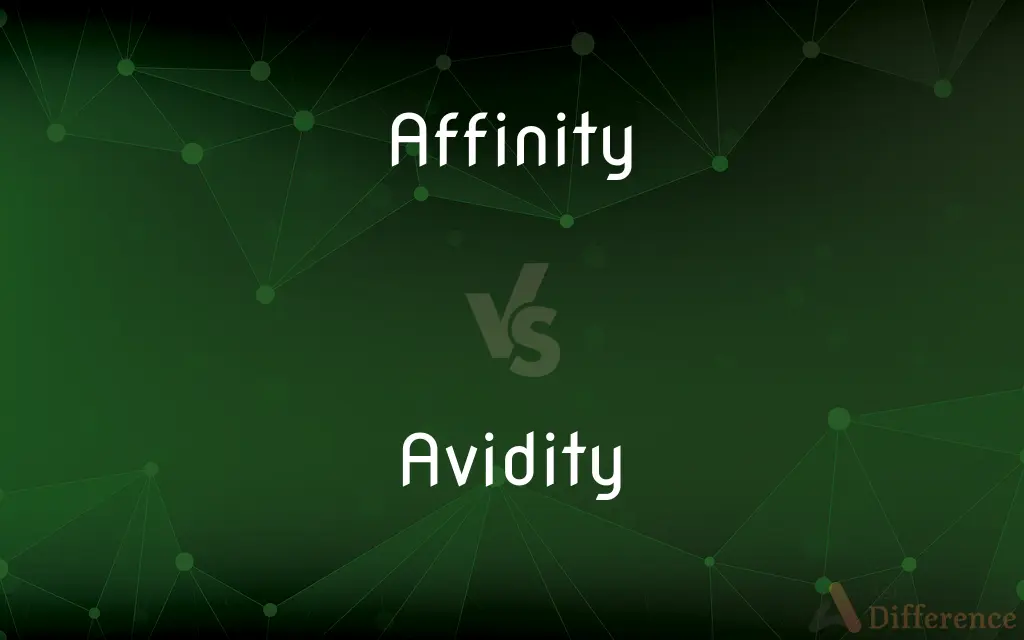Affinity vs. Avidity — What's the Difference?
Edited by Tayyaba Rehman — By Urooj Arif — Updated on March 21, 2024
Affinity reflects the strength of a single interaction, whereas avidity describes the cumulative strength of multiple interactions.

Difference Between Affinity and Avidity
Table of Contents
ADVERTISEMENT
Key Differences
Affinity is a term commonly used to describe the natural liking or attraction to a person, place, thing, or idea, indicating a single bond's strength or preference. Avidity, on the other hand, extends beyond a single interaction, referring to the overall strength derived from multiple bonds or interactions, often used in scientific contexts such as immunology to describe the combined strength of multiple affinities.
Affinity focuses on the quality of a single bond or interaction, suggesting a specific, singular attraction or connection. This concept is often applied in biochemistry, describing how tightly a substrate binds to an enzyme. Avidity enhances this concept by considering the strength of multiple bonds collectively, implying a more robust, overall attraction or binding capacity, critical in understanding the effectiveness of multivalent interactions in biological systems.
While affinity measures the strength of individual interactions, suggesting precision and specificity, avidity captures the cumulative effect of these interactions, providing a broader measure of binding or attraction strength. In immunology, for instance, the affinity of an antibody for its antigen is a measure of a single interaction, whereas the avidity accounts for the combined strength of multiple antibodies binding to an antigen.
The concept of affinity is often used in contexts where a nuanced understanding of individual relationships or preferences is necessary. It helps in evaluating the selective attraction between entities, such as in chemistry or personal relationships. Avidity, however, is more applicable in scenarios where the overall strength or effectiveness of multiple interactions is critical, such as evaluating the strength of an immune response.
Affinity can be thought of as the initial, singular attraction or bond that might draw two entities together, akin to a single thread connecting two points. Avidity, in contrast, is like a rope made of multiple threads, where the combined strength of all threads offers a much stronger connection than any individual thread could provide alone.
ADVERTISEMENT
Comparison Chart
Definition
Strength of single interaction
Cumulative strength of multiple interactions
Contexts
Biochemistry, relationships
Immunology, molecular biology
Measurement
Specificity and strength of single bond
Overall binding or attraction strength
Application
Understanding individual relationships
Evaluating cumulative effect or strength
Analogy
A single thread connecting two points
A rope made of multiple threads
Compare with Definitions
Affinity
A natural liking for something.
She has a strong affinity for classical music.
Avidity
The overall strength of binding between molecules with multiple binding sites.
The avidity of antibodies for their antigen was high.
Affinity
The degree to which a substance tends to combine with another.
The enzyme shows high affinity for the substrate.
Avidity
In biochemistry, the combined strength of multiple molecular interactions.
Avidity plays a crucial role in the effectiveness of vaccines.
Affinity
The force attracting atoms to each other and holding them together in a molecule.
Chemical bonds are formed due to the affinity between atoms.
Avidity
The quality of being eagerly desirous.
She listened to the lecture with avidity.
Affinity
A resemblance in structure between species.
The affinity between the two languages suggests a common origin.
Avidity
The aggregate binding strength of antigen-antibody complexes.
The test measures the avidity of the immune response.
Affinity
In mathematics, a transformation that preserves lines and parallelism.
Affinity transformations include scaling and rotating objects in a plane.
Avidity
Enthusiasm or dedication.
He pursues his studies with great avidity.
Affinity
A natural attraction, liking, or feeling of kinship
A special affinity with animals.
A cultural affinity for the automobile.
Avidity
In biochemistry, avidity refers to the accumulated strength of multiple affinities of individual non-covalent binding interactions, such as between a protein receptor and its ligand, and is commonly referred to as functional affinity. As such, avidity is distinct from affinity, which describes the strength of a single interaction.
Affinity
A natural tendency or ability to use or do something
An affinity with languages.
An affinity for making money.
Avidity
Keen interest or enthusiasm
An avidity for sightseeing.
Affinity
A natural compatibility of one thing with another
“the affinity of pork and shellfish” (Alison Arnett).
Avidity
Strong desire or craving
An insatiable avidity for power.
Affinity
Relationship by marriage
Related by affinity to the wife.
Avidity
See affinity.
Affinity
An inherent similarity between persons or things
“The genius of the Afro-Cubans lay in recognizing the affinity between swing-era jazz and their own tradition” (Gene Santoro).
Avidity
Greediness; strong appetite.
Affinity
(Biology) A relationship or resemblance in structure between species that suggests a common origin.
Avidity
Eagerness; intenseness of desire.
To eat with avidity
Affinity
An attraction or force between particles or chemicals that causes them to combine.
Avidity
(biochemistry) The measure of the synergism of the strength of individual interactions between proteins.
Affinity
The degree to which particles or chemicals are likely to combine
Hemoglobin has a high affinity for oxygen. Also called avidity.
Avidity
Greediness; strong appetite; eagerness; intenseness of desire; as, to eat with avidity.
His books were received and read with avidity.
Affinity
A natural attraction or feeling of kinship to a person or thing.
Avidity
A positive feeling of wanting to push ahead with something
Affinity
A family relationship through marriage of a relative (e.g. sister-in-law), as opposed to consanguinity (e.g. sister).
Affinity
A kinsman or kinswoman of a such relationship; one who is affinal.
Affinity
The fact of and manner in which something is related to another.
Affinity
Any romantic relationship.
Affinity
A love interest; a paramour.
Affinity
Any passionate love for something.
Affinity
(taxonomy) resemblances between biological populations, suggesting that they have a common origin, type or stock.
Affinity
(geology) structural resemblances between minerals; resemblances that suggest that they are of a common origin or type.
Affinity
(chemistry) An attractive force between atoms, or groups of atoms, that contributes towards their forming bonds
Affinity
(medicine) The attraction between an antibody and an antigen
Affinity
(computing) tendency to keep a task running on the same processor in a symmetric multiprocessing operating system to reduce the frequency of cache misses
Affinity
(geometry) An automorphism of affine space.
Affinity
Kinship generally; close agreement; relation; conformity; resemblance; connection; as, the affinity of sounds, of colors, or of languages.
There is a close affinity between imposture and credulity.
Affinity
Companionship; acquaintance.
About forty years past, I began a happy affinity with William Cranmer.
Affinity
That attraction which takes place, at an insensible distance, between the heterogeneous particles of bodies, and unites them to form chemical compounds; chemism; chemical or elective affinity or attraction.
Affinity
A relation between species or higher groups dependent on resemblance in the whole plan of structure, and indicating community of origin.
Affinity
The force attracting atoms to each other and binding them together in a molecule;
Basic dyes have an affinity for wool and silk
Affinity
(immunology) the attraction between an antigen and an antibody
Affinity
(biology) state of relationship between organisms or groups of organisms resulting in resemblance in structure or structural parts;
In anatomical structure prehistoric man shows close affinity with modern humans
Affinity
A close connection marked by community of interests or similarity in nature or character;
Found a natural affinity with the immigrants
Felt a deep kinship with the other students
Anthropology's kinship with the humanities
Affinity
Inherent resemblance between persons or things
Affinity
A natural attraction or feeling of kinship;
An affinity for politics
The mysterious affinity between them
James's affinity with Sam
Common Curiosities
Can affinity and avidity be measured?
Yes, both can be measured; affinity through the specificity and strength of a single bond, and avidity through the overall strength or effectiveness of multiple bonds.
Where is the concept of affinity commonly used?
Affinity is commonly used in biochemistry, relationships, and areas where the quality of individual connections is evaluated.
What is affinity?
Affinity refers to the strength or intensity of a single interaction or attraction towards something.
What does avidity indicate in scientific terms?
In scientific contexts, especially immunology, avidity indicates the overall strength of binding derived from the collective effect of multiple affinities.
Why is avidity important in immunology?
Avidity is important in immunology as it helps understand the strength and effectiveness of the immune response, especially in the case of multivalent antigen-antibody interactions.
Does a higher affinity always mean a stronger overall binding?
Not necessarily; a single high-affinity interaction may not result in strong overall binding if multiple interactions are considered, which is where avidity comes into play.
How do affinity and avidity apply to personal relationships?
Affinity can describe the attraction or connection between individuals, while avidity could metaphorically refer to the depth and strength of a relationship built over multiple interactions.
Are affinity and avidity mutually exclusive?
No, they are interrelated concepts, with avidity building upon the foundation of affinity by considering the cumulative strength of multiple interactions.
How is avidity different from affinity?
Avidity describes the cumulative strength derived from multiple interactions or bonds, whereas affinity focuses on a single bond's strength.
How does the environment affect affinity and avidity?
Environmental factors like temperature, pH, and the presence of other molecules can affect both affinity and avidity by altering the strength and stability of interactions.
How do chemists use the concept of affinity?
Chemists use affinity to describe how strongly a chemical species tends to react or bind with another, influencing reaction mechanisms and outcomes.
Can avidity affect the efficacy of vaccines?
Yes, avidity can significantly affect vaccine efficacy by determining the strength of the immune response through multiple antigen-antibody interactions.
Do affinity and avidity have specific units of measurement?
Affinity is often measured in terms of dissociation constants (Kd), while avidity doesn't have a specific unit but is assessed through comparative measures of binding strength.
Can avidity be increased or decreased?
Avidity can be modulated by changing the valency of interacting molecules or altering environmental conditions, affecting the overall strength of the interactions.
Is avidity a measure of quality or quantity?
Avidity is more about the cumulative strength (quantity) of interactions rather than the quality of any single interaction.
Share Your Discovery

Previous Comparison
Nitrite vs. Nitrate
Next Comparison
Elder vs. EldestAuthor Spotlight
Written by
Urooj ArifUrooj is a skilled content writer at Ask Difference, known for her exceptional ability to simplify complex topics into engaging and informative content. With a passion for research and a flair for clear, concise writing, she consistently delivers articles that resonate with our diverse audience.
Edited by
Tayyaba RehmanTayyaba Rehman is a distinguished writer, currently serving as a primary contributor to askdifference.com. As a researcher in semantics and etymology, Tayyaba's passion for the complexity of languages and their distinctions has found a perfect home on the platform. Tayyaba delves into the intricacies of language, distinguishing between commonly confused words and phrases, thereby providing clarity for readers worldwide.
















































